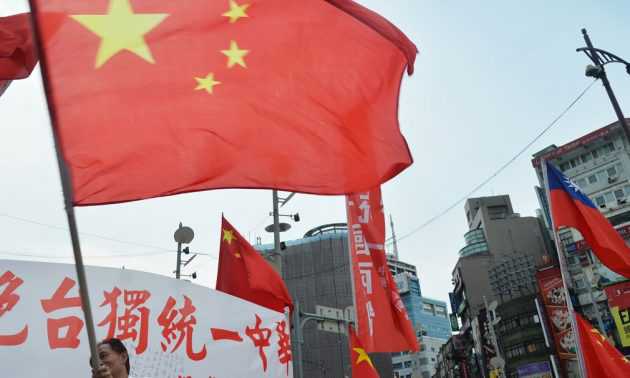Sight of Chinese flags continues to rankle in Taiwan
26 January, 2018

A Chinese flag is seen during a pro-unification rally in Taipei. A Republic of China (Taiwan) flag is seen on the right. Photo: Central News Agency
Tsai Ing-wen has been urged by pro-independence voices to take a page out of the US Communist Control Act
Activists in Taiwan who oppose the open display of People’s Republic of China flags have again mounted a petition to challenge the Ministry of Justice’s policy of non-interference. The latter noted in a statement last month that waving the flag of a foe falls within the realm of free speech.
Some aggravated by the sight of the red flags that sometimes “inundate” thoroughfares in Taipei – such as during Tsai Ing-wen’s presidential inauguration, when pro-unification groups waged a mass rally – say Taiwan should take a page from the US Communist Control Act.
That act is a federal law signed by US president Dwight Eisenhower in 1954. It outlawed the Communist Party of the United States and criminalized membership or support for the party or communist doctrine.
The legislation was introduced amid an ideological surge to fend off Soviet infiltration. Eisenhower’s predecessor Harry Truman, was seen as having been ineffectual in opposing Communism after World War II. Despite curtailing individual liberties and rights of free expression and assembly, the bill was passed by Congress as a matter of national security.
Chu Meng-hsiang, a well-known commentator in Taiwan and a prominent figure in the Lee Teng-hui Association for Democracy, a think tank named after Taiwan’s pro-independence former president, believes Tsai’s administration should table a similar bill. He said it should criminalize not only the display of Chinese flags but also target Communist entities on the self-ruling island, which Beijing still views as being rightfully its own and has never renounced the option of re-capturing militarily.
“The [justice] ministry is oblivious to the critical reality that Communist China’s bayonets are closing in on Taiwan, and the inaction has made pro-Beijing groups all the more confident to go on flying the flag,” Chu wrote in a column in the Taipei Times in which he called on Tsai to demonstrate a firm national will.
“Is [Taiwan’s] democracy really so impregnable that it needs no defence?” he asked.
Several lawmakers from Tsai’s Democratic Progressive Party have also lambasted what they call a “defeatist mindset” that means the government sits idle when pro-unification parties abuse their freedoms and right of expression.
The renewed call to ban the red flag comes against a backdrop of deteriorating cross-strait ties, with tit-for-tat arrests of activists and alleged spies from the other side both in Taiwan and the mainland.
The Chinese military hasn’t minced its words about the possibility of re-taking what it views as a “wayward province.” Meanwhile, in Taiwan, the opposition Kuomintang party alleges there has been widespread persecution of students and politicians who have visited China on study or exchange programs.
Meanwhile, tourist associations in the outlying island of Jinmen, an outpost under Taipei’s sovereignty that is a mere 1.8 kilometers from mainland China, have backed the idea of hanging PRC flags alongside Taiwanese flags in streets and shopping precincts frequented by mainland tourists.
